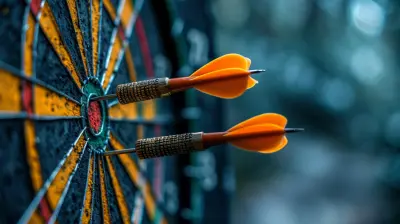16 April 2025
When it comes to productivity, most of us focus on managing our time. After all, there are only so many hours in a day, right? But what if I told you that managing your energy is even more important than managing your time? Think about it—what good is a perfectly planned schedule if you're too drained to actually execute it well?
Time is finite, sure, but energy can ebb and flow, and it’s actually a renewable resource (if you manage it well). Instead of obsessing over squeezing every last second out of your day, let’s discuss how to optimize your energy levels to stay motivated, productive, and balanced. Ready to dig in? Let’s go! 
Why Managing Energy Beats Managing Time
Time Is a Fixed Asset, Energy Is Not
Here’s the deal: you get 24 hours in a day. That’s it. No matter how much you wish for an extra hour to binge your favorite show, it’s not going to happen. Energy, on the other hand, can fluctuate based on factors like sleep, nutrition, exercise, emotions, and even the environment.Think about it: have you ever had a day when you had all the time in the world but couldn’t focus because you were running on fumes? Or a packed day when you absolutely crushed your to-do list because you felt energized and motivated? That’s the power of energy management.
The Energy-Time Connection
Time and energy aren’t entirely separate concepts—they’re intertwined. When you’re low on energy, tasks take longer, mistakes creep in, and burnout rears its ugly head. On the flip side, when your energy is high, you can tackle tasks efficiently and maybe even carve out time for yourself.By prioritizing energy management, you’re essentially giving yourself more bandwidth to handle whatever the day throws at you. 
The Four Dimensions of Energy
Energy isn’t just “physical.” It has multiple dimensions, and neglecting any one of them can lead to imbalance. Let’s break them down:1. Physical Energy
This one’s a no-brainer. Your physical energy is fueled by things like sleep, nutrition, hydration, and exercise. If you’re skipping meals or surviving on four hours of sleep, your energy levels will nosedive, no matter how much coffee you chug.- Pro Tip: Stick to a consistent sleep schedule and adopt the 80/20 rule for nutrition (80% healthy, 20% treats). Your body will thank you.
2. Emotional Energy
Ever notice how a bad mood can zap your energy faster than a six-mile run? Emotional energy is all about how you manage your feelings and stress. Building resilience and practicing mindfulness can keep your emotional battery charged.- Pro Tip: Start journaling or take three minutes a day to focus on deep breathing. You’ll feel the difference.
3. Mental Energy
This is your ability to focus and think clearly. Mental clutter—like endless notifications and constant multitasking—can drain your energy faster than you realize.- Pro Tip: Block out chunks of time to work on important tasks distraction-free (hello, airplane mode) and try brain-boosting activities like puzzles or reading.
4. Spiritual Energy
Wait, I’m not getting woo-woo on you, I promise. Spiritual energy is about purpose and meaning. When you feel connected to a bigger “why,” it’s easier to stay motivated and energized.- Pro Tip: Reflect on what truly matters to you and align your daily activities with those values. 
Strategies to Manage Your Energy
Now that you know energy comes in multiple flavors, let’s dive into practical tips for managing it.1. Prioritize Sleep Like It’s Your Job
Good sleep is the cornerstone of high energy levels. Think of your body like a smartphone—if you don’t charge it overnight, it’s bound to die during the day.- Aim for 7-9 hours of sleep each night.
- Create a bedtime routine (dim the lights, put your phone away).
- Keep your room cool, dark, and quiet for better rest.
2. Eat for Energy, Not Just Convenience
Your body is like a car—it runs best on premium fuel. Eating junk food is like filling your tank with soda. Sure, it might get you a few miles, but you’ll stall out fast.- Focus on whole foods like fruits, veggies, lean proteins, and healthy fats.
- Stay hydrated—dehydration equals sluggishness.
- Avoid the sugar rollercoaster by balancing carbs with protein.
3. Move Your Body Every Day
You don’t need to become a gym rat, but regular movement is non-negotiable if you want to boost your energy. Exercise pumps oxygen and nutrients to your cells, leaving you more awake and alert.- Take a brisk walk during lunch.
- Stretch for 10 minutes in the morning.
- Dance in your living room (yes, it counts)!
4. Take Control of Your Mental Focus
Your brain isn’t a machine—it can’t run at full speed all day long. Give it regular breaks to prevent burnout.- Try the Pomodoro technique: work for 25 minutes, then take a 5-minute break.
- Limit multitasking (it’s an energy-draining myth).
- Declutter your workspace to improve focus.
5. Schedule “Energy Breaks”
Instead of crashing at 3 PM, plan short breaks throughout the day to recharge. Step away from your desk, stretch, or simply stare out of the window (without doom-scrolling).- Schedule a 10-minute recharge every 90 minutes.
- Use breaks to do something fun or relaxing, like listening to a favorite song.
6. Protect Your Emotional Energy
Negative interactions (or too much doom in the news) can be huge energy drains. Set boundaries and surround yourself with positivity.- Say "no" to unnecessary commitments.
- Practice gratitude—it’s a mood booster.
- Spend more time with people who lift you up.
7. Find Your “Why”
When your tasks align with your purpose, they don’t feel as exhausting, even when they’re challenging. Ask yourself: Why am I doing this? Does it matter to me?- Write down your goals and revisit them often.
- Focus on work or hobbies that align with your passions. 
How to Build Energy Habits That Stick
Alright, all these tips sound great, but how do you actually incorporate them into your life without feeling overwhelmed? The key is to focus on small, consistent changes.1. Start Small: Pick one or two energy habits to work on at a time. Maybe you commit to drinking more water or taking a 5-minute break after every hour of work.
2. Track Progress: Use a journal or app to stay accountable. Seeing your progress can be motivating!
3. Be Kind to Yourself: No one’s perfect. If you slip up, just get back on track without beating yourself up.
The Ripple Effect of Energy Management
When you prioritize managing your energy, everything else falls into place. You’ll find it easier to stay productive, maintain healthy relationships, and actually enjoy life. It’s not about squeezing every second out of the day—it’s about making the most of the energy you have and recharging when you need to.So, the next time you’re tempted to pack your schedule full of tasks, stop and ask yourself: do I have the energy for this? If not, it’s probably time to take a step back and refill your tank.




Lillian Hernandez
Absolutely loved this article! Focusing on energy management is such a refreshing approach to productivity. Embracing our natural rhythms can truly transform our work experience. Here’s to more vibrant and energized days ahead! 🌟
April 16, 2025 at 2:38 AM